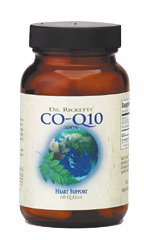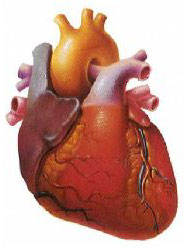|
CO-ENZYME Q-10 DEFICIENCY
|
Normal blood and tissue levels of Co-Q-10 have been well established by numerous investigators around the world. Significantly decreased levels of Co-Q-10 have been noted in a wide variety of diseases in both animals and human studies. Co-Q-10 deficiency may be caused by insufficient dietary Co-Q-10, impairment in Co-Q-10 biosynthesis, excessive utilization of Co-Q-10 by the body, or a combination of the three. Dr. Karl Folkers takes the position that the dominant source of Co-Q-10 in Man is biosynthesis. This complex 17 step process using all the B-Complex vitamins including several trace elements, is, by its nature, highly vulnerable. Dr. Folkers argues that average ìnormalî levels of Co-Q-10 are really sub-optimal and the very low levels observed in advanced disease states, represent on the tip of the deficiency "ice berg".
|
HEART DISEASE AND CO-Q-10
|
Drugs used to treat elevated cholesterol levels, also block the biosynthesis of Co-Q-10 in the heart muscle, where it is needed most.
Co-Q-10 is known to be highly concentrated in heart muscle cells due to the high energy requirements of this cell type. For the past 14 years, the great bulk of clinical work with Co-Q-10 has focused on heart disease. Specifically congestive heart failure has been strongly correlated with significantly low blood and tissue levels of Co-Q-10. The severity of heart failure correlates with the severity of Co-Q-10 deficiency. This deficiency of Co-Q-10 appears to be a major treatable factor in the progression of heart failure.
According to Dr. Julian Whitaker, Co-Q-10 is the most powerful treatment of cardiomyopathy available. He states that it increases the survival rate of cardiomyopathy patients tenfold, compared to the combined therapy of ACE inhibitors, diuretics and digitalis drugs. Several trials showed the gradual and sustained improvement in the blood pumped out of the heart as well as improvement in fatigue, chest pain and palpitations.
|
Co-Q-10 Formulation Influences Bioavailability
Summary: The relative bioavailability
of typical commercially available forms of Co-Enzyme Q-10 including other softgels,
was compared with Dr. Ricketts' Soft-Gel Biosolvô Co-Q-10, a new form of
Co-Q-10, in human subjects in two separate trials, performed at the new York Medical
College. The data from both trials show that Soft-Gel, delivers 300% greater plasma
levels of Co-Q-10 compared to all other Co-enzyme Q-10 products. This means that
much lower doses of Soft-Gel are required to rapidly reach and maintain adequate
blood Q-10 values. A primary reason for the elevated blood plasma levels, is due
to Soft-Gel 100% dissolution, thereby allowing superior absorption and assimilation.


|

Co-Enzyme Q-10 is a key to our body's
electron transport system and cellular
energy production
|
Co-Q-10 ESSENTIAL TO ALL CELLS
|
Since Co-Q-10 is necessary for optimal function of all cells, it is not surprising to learn of the diverse number of diseases which respond favorably to Co-Q-10.
Disease states that involve immune dysfunction, have been recognized to have low levels of Co-Q-10. Q-10 is a powerful antioxidant and can greatly reduce oxidative damage to tissues as well as inhibit oxidation of LDL cholesterol. Co-Q-10 protects the mitochondria, the power-house of the cell, from free radical damage. Co-Q-10 is LIFE FORCE.
|